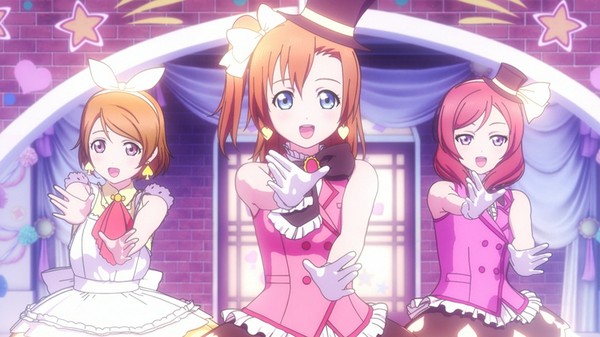The Japanese do love their idols. From AKB48 and onwards, just about every town and city in the country has an idol group. Some are local, and only of a couple of people. Others are the size of AKB (127 active members at a time).
These groups of charmingly pretty young women belt out the most innocent and pleasant pop tunes that their producers can pay to have written for them, but musical talent isn’t really what they’re there for. These girls have a single task; earn the adoration of fans, and make themselves commercial enough that those fans will turn over the big bucks to buy not one, but boxes of the same CD, and spend even bigger dollars to go to concerts, or even have the chance to shake the hand of their favourite idol.
As you can probably guess, idols, and the obsessive culture that builds up around them, are not free of controversy. Beyond the reality that a percentage of the fans become dangerously obsessed with their favourite girls, the pressures put on the girls themselves are intense. Because they have to keep a virginal, aspirational image, for example, dating and romance is typically banned, and as we saw with the case of one of AKB’s girls shaving her head in shame after being caught leaving a man’s home late at night, the punishments can be severe and humiliating. Being part of an idol group is also an intensively competitive experience, as you can imagine when 48 or so aspiring pop stars come together and are ranked each year through a popular vote from fans.
It’s not healthy in reality, and it only benefits the girls for a very short time. Very few AKB48 members, for example, manage to become respected music artists when they are made to leave the group (typically before the age of 30), because very few of them have actual talent as musicians. And if the AKB48 girls struggle to find a voice independent of their groups after “graduation,” you can imagine how hard it must be for the less major idol groups.
So Love Live! School Idol Project is about idols, but in choosing to ignore the darker and more competitive side of idol life and culture, it is completely naive about it all. That might sound like an issue, but it’s also so very, very charming, and that makes it consistently surprising in how it leaves the audience feeling good about what they’re watching. This anime has developed a fearsome fan base of its own, and it’s a combination of humour and spirit that gets it there.
A school that is not getting enough enrolments is scheduled to be shut down, much to the distress of its students, who really quite like their time there. One of them, the hopeless-but-adorable Honoka, has the grand idea that best way to reinvigorate interest in the school is to start a school idol superstar club. The only problem is that she – and her band of friends – can’t sing, dance, and don’t have the support of their school’s governing body, meaning they’re not even meant to form an idol group.
Not people to let these technicalities get in the way of their ambition, the girls set out on their long road to idol success, and we get taken along for that ride. Love Life is at heart a story of drive, ambition, and the merits of hard work, and really tries hard to leave a smile on the audience’s face from start to finish. Honoka is a clumsy, but innocent and earnest sort, and a generally likable lead, though her raw enthusiasm can become tiring after a while. The rest of Honoka’s group all have their own quirks, with each episode of the anime taking the opportunity to explore how someone can overcome personal weaknesses and fears to become a useful, vital cog in the mechanics of the overall team. There’s barely an episode that goes by without one of the characters making a rousing speech about how hard they’re going to work so they can succeed, and while that’s something we have seen in countless anime before, it’s only because it’s a very Japanese way of looking at the world, and it’s rarely delivered with this much panache.
And of course an idol anime wouldn’t work so well without plenty of idol music, and Love Life delivers on this account too. Whoever sourced the soundtrack of Love Life deserves a medal, because they have done a truly wonderful job here in making sure each new episode has new and entertaining music to listen to. Idol music works a little like a factory in the frequency of which it churns stuff out more out a goal of selling copies then producing something artful, and this is also captured with great effectiveness by the anime.
The dancing – which you might expect given the nature of idols would be as important as the music itself – is pitch perfect, too. Each time the girls perform the visual is one of an animated video clip, that you might expect to see real idol groups invest in. Because the animation is so important to the experience of Love Live it is of a cut above what we see in most other anime. Further to this, the character and costuming designs are a real delight, and because the narrative itself is quite straightforward, it’s easy to kick back and simply enjoy, rather than ponder over.
What genuinely surprised me was the way Love Life avoids the fanservice side of things, which I was expecting to be turned up to 11, given the way Japanese anime likes to fanservice up both idols and school dramas. But now I understand why I keep seeing girls dresses as Love Life characters at game and anime expos; it’s the kind of experience that men and women can equally enjoy. It’s innocent on the content side of things, but has just enough flirty charm about it to also have energy and the requisite teen spirit. I haven’t had my expectations more subverted in an anime since My Teen Romantic Comedy SNAFU.
I adore Love Live. It has its issues in glamorising idol culture when idol culture rightfully deserves the criticism that it draws from commentators both in Japan and the west. But at the same time it has such a light hearted personality and earnestness that I found it very hard to put down. This is, this side of Persona 4’s anime, my new favourite for the medium.
– Matt S.
Editor-in-Chief
Find me on Twitter: @digitallydownld
This anime can be purchased from Madman Entertainment in Australia and New Zealand










